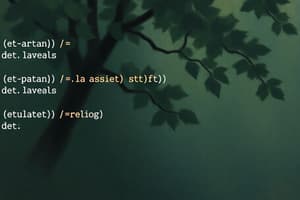Podcast
Questions and Answers
What does the term 'operator' refer to in programming?
What does the term 'operator' refer to in programming?
- A data type in C programming
- An operand used in calculations
- A value that performs operations
- A symbol used to perform operations (correct)
In the expression int value = 10+20*20;, why is the value 210?
In the expression int value = 10+20*20;, why is the value 210?
- Multiplicative operator has higher precedence than the additive operator (correct)
- Additive operator has higher precedence than the multiplicative operator
- Precedence of operators does not matter in this expression
- The value should have been 400
Which type of operation does the minus (-) operator perform?
Which type of operation does the minus (-) operator perform?
- Increment
- Multiplication
- Subtraction (correct)
- Division
What does the modulo (%) operator do in arithmetic operations?
What does the modulo (%) operator do in arithmetic operations?
Which operator is used to increment a variable by 1 in C programming?
Which operator is used to increment a variable by 1 in C programming?
What is the primary purpose of a logical operator in programming?
What is the primary purpose of a logical operator in programming?
What is the purpose of the printf() function in C?
What is the purpose of the printf() function in C?
Which function is used to read values from the keyboard in C?
Which function is used to read values from the keyboard in C?
In C programming, what does the '&' symbol represent in scanf() function?
In C programming, what does the '&' symbol represent in scanf() function?
What is the purpose of the sprintf() function in C?
What is the purpose of the sprintf() function in C?
Which function reads data from a string or character array instead of the console screen in C?
Which function reads data from a string or character array instead of the console screen in C?
What is the purpose of the scanf() function in C?
What is the purpose of the scanf() function in C?
What is the purpose of the getchar() function?
What is the purpose of the getchar() function?
What is the main difference between the getchar() and putchar() functions?
What is the main difference between the getchar() and putchar() functions?
Which function is used to read a single string from the keyboard in C?
Which function is used to read a single string from the keyboard in C?
In C programming, what does scanf() do?
In C programming, what does scanf() do?
What does the 'int printf(const char *format,...)' function do?
What does the 'int printf(const char *format,...)' function do?
What does a '%f' format specifier represent in C?
What does a '%f' format specifier represent in C?
Which function is used to display a string on the screen or console in C?
Which function is used to display a string on the screen or console in C?
'%ld' format specifier in C is used for which data type?
'%ld' format specifier in C is used for which data type?
Which function is used to read a single character from the keyboard and store it?
Which function is used to read a single character from the keyboard and store it?
What does the 'int i;' variable hold in this line of code: scanf("%s %d", str, &i);?
What does the 'int i;' variable hold in this line of code: scanf("%s %d", str, &i);?
In C language, how are the corresponding bits of two operands treated in the bitwise AND operation?
In C language, how are the corresponding bits of two operands treated in the bitwise AND operation?
What is the purpose of the sizeof operator in C?
What is the purpose of the sizeof operator in C?
Which operator in C is used for bitwise exclusive OR operations?
Which operator in C is used for bitwise exclusive OR operations?
What does the comma operator do in C programming?
What does the comma operator do in C programming?
Which type of expression contains only arithmetic operators and operands?
Which type of expression contains only arithmetic operators and operands?
What does the unary minus (-) operator do in C?
What does the unary minus (-) operator do in C?
How are binary expressions evaluated in C?
How are binary expressions evaluated in C?
What is the output when a bitwise OR operation is performed on two operands with bit values 1 and 0?
What is the output when a bitwise OR operation is performed on two operands with bit values 1 and 0?
'A' + 2 evaluates to which value in C?
'A' + 2 evaluates to which value in C?
What is the first step to convert a valid C expression to its mathematical form and evaluate it?
What is the first step to convert a valid C expression to its mathematical form and evaluate it?
Which operator in the given expression has the highest precedence?
Which operator in the given expression has the highest precedence?
What is the associativity of multiplicative operators in the expression?
What is the associativity of multiplicative operators in the expression?
How are sub-expressions treated after an operator is bound to their operands?
How are sub-expressions treated after an operator is bound to their operands?
Which step is crucial in converting a complex C expression to a mathematical equation?
Which step is crucial in converting a complex C expression to a mathematical equation?
What is the main concern with the expression -a-+ -b++ * -c?
What is the main concern with the expression -a-+ -b++ * -c?
Which type of associativity do additive operators have?
Which type of associativity do additive operators have?
What are the first set of operators scanned in the given expression?
What are the first set of operators scanned in the given expression?
In which order are multiplicative operators scanned in the expression?
In which order are multiplicative operators scanned in the expression?
Why are sub-expressions considered as single operands after an operator is bound?
Why are sub-expressions considered as single operands after an operator is bound?
Which operator precedence determines the order of evaluation of expressions in C programming?
Which operator precedence determines the order of evaluation of expressions in C programming?
In C, for the expression 20/4*2, what is the result due to the precedence of operators?
In C, for the expression 20/4*2, what is the result due to the precedence of operators?
Which associativity describes the direction of evaluation for the unary operators in C?
Which associativity describes the direction of evaluation for the unary operators in C?
What is the result of the expression 5 + 5 * 3 - 2 / 2 due to the precedence of operators in C?
What is the result of the expression 5 + 5 * 3 - 2 / 2 due to the precedence of operators in C?
In C language, what is the purpose of the Turnery or Conditional Operator?
In C language, what is the purpose of the Turnery or Conditional Operator?
Which category of operators includes ++ and -- that are evaluated from left to right in C?
Which category of operators includes ++ and -- that are evaluated from left to right in C?
What will be the outcome of the expression 3 - 2 + 5 * 6 / 2 according to the precedence of operators in C?
What will be the outcome of the expression 3 - 2 + 5 * 6 / 2 according to the precedence of operators in C?
In C programming, what is the output of a bitwise XOR operation if one of the operands is 1 and the other is 0?
In C programming, what is the output of a bitwise XOR operation if one of the operands is 1 and the other is 0?
When evaluating an arithmetic expression in C, how does the unary minus operator (-) operate on a single operand?
When evaluating an arithmetic expression in C, how does the unary minus operator (-) operate on a single operand?
For the expression 'A' + 2 in C, what does the value 67 represent?
For the expression 'A' + 2 in C, what does the value 67 represent?
Which bitwise operator in C is used to check if corresponding bits of two operands are both 1?
Which bitwise operator in C is used to check if corresponding bits of two operands are both 1?
What is the main purpose of the comma operator in linking expressions together?
What is the main purpose of the comma operator in linking expressions together?
When evaluating valid arithmetic expressions in C, which type of operands can be involved?
When evaluating valid arithmetic expressions in C, which type of operands can be involved?
For bitwise OR operations in C, what is the output if none of the operands have a bit value of 1?
For bitwise OR operations in C, what is the output if none of the operands have a bit value of 1?
'sizeof' operator in C is used to determine what aspect of operands?
'sizeof' operator in C is used to determine what aspect of operands?
In the expression -a+ b * c - d I e + f, which operators have the next highest precedence after the unary operators?
In the expression -a+ b * c - d I e + f, which operators have the next highest precedence after the unary operators?
For the expression -a-+ -b++ * -c, what is the primary reason it is considered invalid?
For the expression -a-+ -b++ * -c, what is the primary reason it is considered invalid?
If the expression -a+ b * c - d I e + f is evaluated starting from left-to-right, what will be the first set of operands for the binary operators?
If the expression -a+ b * c - d I e + f is evaluated starting from left-to-right, what will be the first set of operands for the binary operators?
Considering the expression -a-+ -b++ * -c, what is the associativity of the additive operators used in this context?
Considering the expression -a-+ -b++ * -c, what is the associativity of the additive operators used in this context?
What is the order of evaluation specified for sub-expressions at the same level in C expressions?
What is the order of evaluation specified for sub-expressions at the same level in C expressions?
When evaluating expressions, which type of operator has the highest precedence?
When evaluating expressions, which type of operator has the highest precedence?
In C, how are sub-expressions treated after an operator is bound to their operands?
In C, how are sub-expressions treated after an operator is bound to their operands?
Assuming a=1.5, b=2.5, and c=3.5, what would be the result of evaluating the expression a+b*c?
Assuming a=1.5, b=2.5, and c=3.5, what would be the result of evaluating the expression a+b*c?
What is the purpose of the sprintf() function in C?
What is the purpose of the sprintf() function in C?
Which function is used to store the variable value on the memory location of that variable in C?
Which function is used to store the variable value on the memory location of that variable in C?
What does the '%d' format specifier represent in C?
What does the '%d' format specifier represent in C?
Which function reads data from the string or character array instead of the console screen in C?
Which function reads data from the string or character array instead of the console screen in C?
'&' symbol in scanf() function is used for what purpose in C?
'&' symbol in scanf() function is used for what purpose in C?
What is the primary difference between sprintf() and printf() functions in C?
What is the primary difference between sprintf() and printf() functions in C?
'scanf()' and 'sscanf()' functions in C differ mainly in their:
'scanf()' and 'sscanf()' functions in C differ mainly in their:
'sscanf()' function in C reads data from where compared to 'scanf()' function?
'sscanf()' function in C reads data from where compared to 'scanf()' function?
What is the purpose of the 'sscanf()' function in C?
What is the purpose of the 'sscanf()' function in C?
What is the primary difference between 'printf()' and 'sprintf()' functions in C?
What is the primary difference between 'printf()' and 'sprintf()' functions in C?
What does the '%n' format specifier do in C?
What does the '%n' format specifier do in C?
In C, what does the 'puts()' function do compared to 'gets()' function?
In C, what does the 'puts()' function do compared to 'gets()' function?
What does the '%lf' format specifier represent in C?
What does the '%lf' format specifier represent in C?
How does the 'scanf("%s %d", str, &i);' line in C function?
How does the 'scanf("%s %d", str, &i);' line in C function?
'getchar()' and 'putchar()' functions are primarily used to perform which operations in C?
'getchar()' and 'putchar()' functions are primarily used to perform which operations in C?
'scanf("%s %d", str, &i);' function is primarily used for what purpose in C programming?
'scanf("%s %d", str, &i);' function is primarily used for what purpose in C programming?
Flashcards are hidden until you start studying





